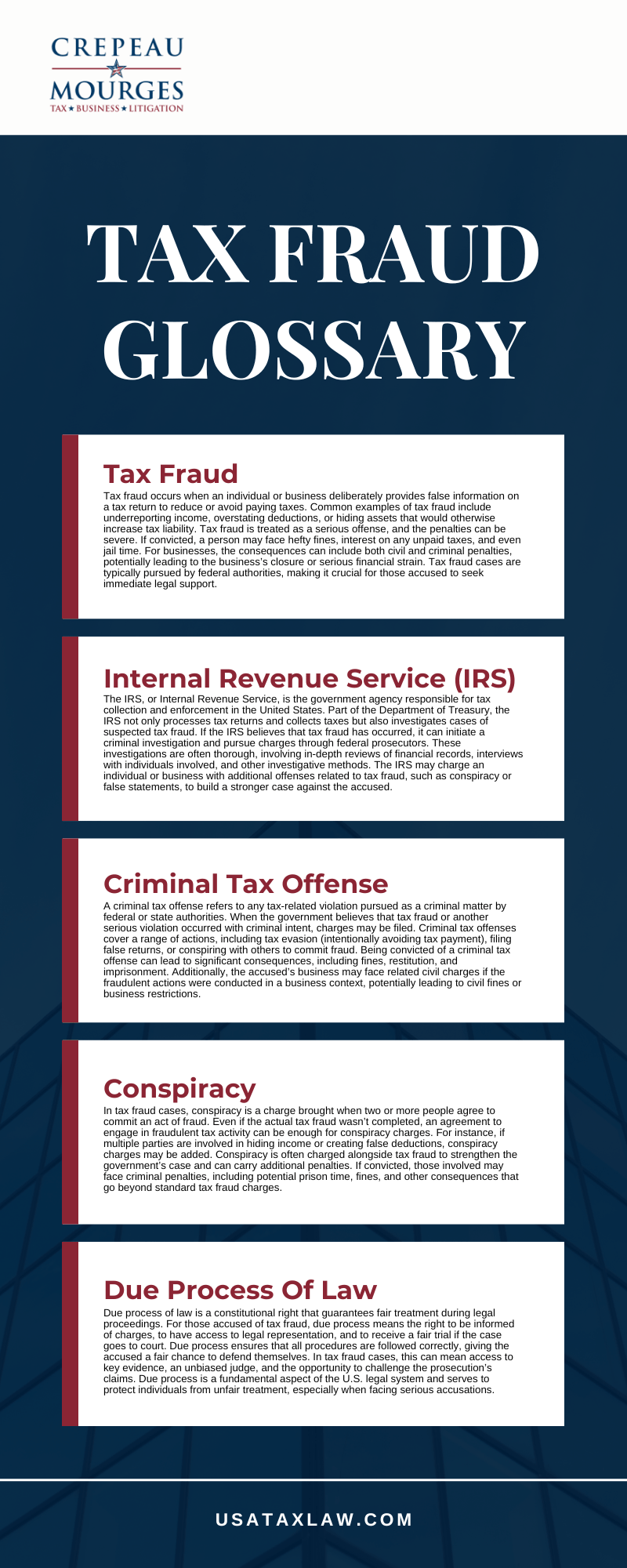
If you are facing serious problems with your taxes, when you need a tax fraud lawyer Baltimore, MD residents trust from Crepeau Mourges. Did you have issues with reporting your taxes? Or have you found out that you are under investigation for fraud? Have you been accused of a serious tax offense on a criminal level? If so, then it’s time to get a lawyer now. If this situation applies to you, here are just a few things that you must know at this time:
Tax Fraud Overview
Tax fraud happens when a person or business purposefully and unlawfully does not pay taxes. The government can take action against an individual or company either on the civil or criminal level. Federal prosecutors have been increasingly pursuing charges against people who they think have committed tax fraud. In some situations, the government may charge the person on a criminal level and then that person’s business in civil court for the same conduct.
A Baltimore, MD tax fraud lawyer urges you to not let the situation get out of control. The sooner you get assistance from a reputable lawyer, the better your chances are of building a strong case. We understand that learning you are under scrutiny by the federal government for taxes can be terrifying. The only way to really get this under control is by recruiting a seasoned legal team to protect you.
The Internal Revenue Service (IRS)
This executive agency is part of the Department of Treasury, and not only processes tax returns but investigates people who may have committed a tax crime. It isn’t uncommon for the government to charge people with a tax crime in addition to conspiracy, where it is argued that the defendant agreed with another person to commit the crime. The IRS sends thousands of agents to detect and hold accountable those who have committed tax related offenses.
However, not every person who they suspect has engaged in tax fraud is actually guilty. With that being said, it is also important to know that your lawyer is not here to decide whether you are guilty or not. It is our job to protect you and make sure that you are being treated fairly in the due process of law. In order to fully understand your situation and what it at-stake, you must be transparent with the details of your supposed offense.
Baltimore Tax Fraud Infographic
Tax Fraud Glossary
At Crepeau Mourges, we believe that understanding the legal basics can help you make informed decisions about your case. Below are key terms you might encounter when working with a tax fraud attorney.
Tax Fraud
Tax fraud occurs when an individual or business deliberately provides false information on a tax return to reduce or avoid paying taxes. Common examples of tax fraud include underreporting income, overstating deductions, or hiding assets that would otherwise increase tax liability. Tax fraud is treated as a serious offense, and the penalties can be severe. If convicted, a person may face hefty fines, interest on any unpaid taxes, and even jail time. For businesses, the consequences can include both civil and criminal penalties, potentially leading to the business’s closure or serious financial strain. Tax fraud cases are typically pursued by federal authorities, making it crucial for those accused to seek immediate legal support.
Internal Revenue Service (IRS)
The IRS, or Internal Revenue Service, is the government agency responsible for tax collection and enforcement in the United States. Part of the Department of Treasury, the IRS not only processes tax returns and collects taxes but also investigates cases of suspected tax fraud. If the IRS believes that tax fraud has occurred, it can initiate a criminal investigation and pursue charges through federal prosecutors. These investigations are often thorough, involving in-depth reviews of financial records, interviews with individuals involved, and other investigative methods. The IRS may charge an individual or business with additional offenses related to tax fraud, such as conspiracy or false statements, to build a stronger case against the accused.
Criminal Tax Offense
A criminal tax offense refers to any tax-related violation pursued as a criminal matter by federal or state authorities. When the government believes that tax fraud or another serious violation occurred with criminal intent, charges may be filed. Criminal tax offenses cover a range of actions, including tax evasion (intentionally avoiding tax payment), filing false returns, or conspiring with others to commit fraud. Being convicted of a criminal tax offense can lead to significant consequences, including fines, restitution, and imprisonment. Additionally, the accused’s business may face related civil charges if the fraudulent actions were conducted in a business context, potentially leading to civil fines or business restrictions.
Conspiracy
In tax fraud cases, conspiracy is a charge brought when two or more people agree to commit an act of fraud. Even if the actual tax fraud wasn’t completed, an agreement to engage in fraudulent tax activity can be enough for conspiracy charges. For instance, if multiple parties are involved in hiding income or creating false deductions, conspiracy charges may be added. Conspiracy is often charged alongside tax fraud to strengthen the government’s case and can carry additional penalties. If convicted, those involved may face criminal penalties, including potential prison time, fines, and other consequences that go beyond standard tax fraud charges.
Due Process Of Law
Due process of law is a constitutional right that guarantees fair treatment during legal proceedings. For those accused of tax fraud, due process means the right to be informed of charges, to have access to legal representation, and to receive a fair trial if the case goes to court. Due process ensures that all procedures are followed correctly, giving the accused a fair chance to defend themselves. In tax fraud cases, this can mean access to key evidence, an unbiased judge, and the opportunity to challenge the prosecution’s claims. Due process is a fundamental aspect of the U.S. legal system and serves to protect individuals from unfair treatment, especially when facing serious accusations.
If you’re dealing with tax fraud charges in Baltimore, MD, don’t wait to seek guidance. Contact Crepeau Mourges today for a consultation, and let us help you understand your options for moving forward with confidence.
Call Crepeau Mourges Now For Tax Guidance
The team at our law firm is ready and available to discuss your case with you. Please do not let the situation escalate before you get legal help. If the government has a criminal case against you, this is a very serious accusation that needs seasoned representation. Call a tax fraud lawyer in Baltimore, Maryland at Crepeau Mourges now for immediate legal guidance.
Baltimore Tax Fraud Statistics
According to statistics from the most recently reported fiscal year, the Internal Revenue Service (IRS) Criminal Investigation division initiated more than 2,676 criminal investigations, identifying over $37.1 billion in tax and financial crimes. The IRS’s conviction rate for tax fraud is just under 90 percent.
If you have been charged with tax fraud, call a Baltimore tax fraud lawyer immediately.
Common Types Of Tax Fraud And Their Legal Consequences
Our Baltimore, MD tax fraud lawyer knows that tax fraud is a serious issue that involves intentionally providing false or misleading information on tax returns to avoid paying the taxes owed. While errors or miscalculations can happen unintentionally, fraud is characterized by deliberate actions to evade tax responsibilities. We offer 24/7 call answering and we are here to help you when you need it. At Crepeau Mourges, we assist individuals and businesses dealing with tax fraud allegations, helping them address these matters effectively.
Failing To Report Income
One of the most common forms of tax fraud is failing to report all sources of income. This can include wages from secondary jobs, tips, or income from freelance work. Intentionally underreporting income or omitting certain earnings can result in substantial penalties. The IRS has various methods for detecting unreported income, including matching information from third parties, such as employers or financial institutions, with tax returns.
If caught, the consequences can range from financial penalties to criminal charges, depending on the amount of unreported income and the level of intent involved. Individuals found guilty of willfully evading taxes may face fines, restitution, and even imprisonment.
Claiming False Deductions
Claiming deductions that you are not entitled to or inflating legitimate deductions to reduce taxable income is another common form of tax fraud. Examples include overstating business expenses, fabricating charitable contributions, or claiming personal expenses as business-related.
While audits often reveal false deductions, individuals who knowingly file fraudulent returns can face significant fines and additional taxes owed. In severe cases, criminal charges for tax fraud can be pursued, which may result in imprisonment and damage to one’s financial reputation.
Using Fake Documents
Submitting fraudulent documents to support tax returns, such as fake receipts, forged forms, or false financial statements, is a deliberate act of tax fraud. This type of fraud is often linked to attempts to inflate deductions, claim unearned tax credits, or lower taxable income.
When fraudulent documentation is uncovered, penalties include repayment of the taxes owed, additional fines, and possible criminal charges. The penalties increase significantly if the fraud involves a substantial amount of money or shows a clear pattern of deceit.
Hiding Assets
Our tax fraud lawyer in Baltimore knows that hiding assets to avoid tax liability is a more sophisticated form of tax fraud that often involves offshore accounts, shell companies, or transferring property to other individuals. This tactic is commonly used by individuals or businesses with significant wealth, aiming to obscure the true value of their taxable income or assets.
The IRS has developed specific programs and technology to detect hidden assets, and the consequences for those caught can be severe. In addition to paying back taxes, offenders may face substantial fines and possible imprisonment.
Misclassifying Employees
In business settings, misclassifying employees as independent contractors is another form of tax fraud. This practice can reduce payroll tax obligations and shift certain financial responsibilities to workers. While misclassification can sometimes occur unintentionally, deliberate efforts to do so may result in penalties, back taxes, and interest payments.
Addressing Tax Fraud Allegations
Tax fraud accusations can have serious financial and legal repercussions. If you or your business are facing an investigation, it is important to take immediate action to address the matter. Attorney Brian Crepeau is one of our founding partners and is dedicated to helping you find a clear path through your legal troubles. At Crepeau Mourges, we help our clients address these allegations while protecting their rights and interests. Contact our Baltimore tax fraud lawyer today to schedule a consultation and learn more about how we can assist you.
Steps To Take If You’re Accused Of Tax Fraud
Our Baltimore, MD tax fraud lawyer knows that being accused of tax fraud is a serious matter that requires prompt and careful action. Allegations of this nature can lead to significant financial penalties, damage to your reputation, and even criminal charges. At Crepeau Mourges, we help individuals and businesses address these accusations effectively, guiding them through each step of the process. Please contact us for a free case review.
1. Review the Allegations Carefully. The first step is to understand the specific allegations against you. Tax fraud accusations often stem from discrepancies in tax returns, unreported income, or questionable deductions. Review any correspondence you’ve received from the IRS or state tax authorities, paying close attention to deadlines and required responses. Knowing what you’re accused of will help you take appropriate action.
2. Avoid Contacting the Authorities Directly. It may be tempting to reach out to the IRS or state tax officials to explain your situation, but doing so without legal guidance can lead to unintentional missteps. Anything you say could be used against you later. It’s better to have a professional handle communications to avoid making statements that could complicate your case.
3. Gather Relevant Documents. Start collecting all records related to your taxes, income, and expenses. This includes tax returns, W-2s, 1099s, receipts, and financial statements. These documents can help clarify the situation and provide a foundation for addressing the allegations. If you’re missing any records, take steps to retrieve them, as incomplete documentation could hinder your case.
4. Understand Your Rights. As someone accused of tax fraud, you have rights, including the right to remain silent and the right to legal representation. Familiarize yourself with these rights and exercise them as needed. Remaining calm and informed can make a significant difference in how your case progresses.
5. Avoid Making Any New Filings Without Guidance. Filing amended returns or other tax documents without consulting a legal or tax professional could worsen your situation. Mistakes made during this time might appear as an admission of guilt or further confuse the matter. Wait until you’ve sought professional advice before taking any actions related to your taxes.
6. Seek Legal Representation Immediately. Our Baltimore tax fraud lawyer knows that one of the most important steps is securing legal representation. An attorney experienced in tax matters can help assess your situation, communicate with tax authorities on your behalf, and develop a strategy to resolve the allegations. A knowledgeable advocate can also help protect your rights throughout the process.
7. Develop a Plan for Resolution. Once your attorney has reviewed the case, they can help determine the best course of action. This might involve negotiating with tax authorities, providing additional documentation, or challenging the allegations through legal means. The goal is to resolve the issue in a way that minimizes financial and legal consequences.
8. Stay Compliant Moving Forward. While addressing the current allegations, it’s essential to remain compliant with all tax obligations going forward. This includes filing accurate returns, paying taxes on time, and maintaining organized financial records. Demonstrating good faith can be beneficial in resolving the case.
Protect Your Future With Professional Support
If you’re facing allegations of tax fraud, acting quickly and responsibly is critical. At Crepeau Mourges, we work with clients to address these challenges while protecting their rights. Attorney Mourges is a board-certified tax attorney and can help with your case. Contact our tax fraud lawyer in MD today to schedule a consultation and discuss how we can assist you in resolving your tax fraud case effectively.
How A Lawyer Gathers Evidence When Accused Of Tax Fraud
Our Baltimore, MD tax fraud lawyer knows that being accused of tax fraud can be overwhelming, but one of the first steps in defending against these accusations is gathering the right evidence. A lawyer plays a critical role in building a strong defense by identifying and organizing documents, interviewing relevant parties, and analyzing the facts. Attorney Brian is a founder of our firm and is dedicated to helping his clients. At Crepeau Mourges, we’ve addressed some common questions about how a lawyer approaches evidence gathering in tax fraud cases to give you a better understanding of what’s involved.
What Types Of Documents Are Needed To Defend Against Tax Fraud Accusations?
The specific documents required depend on the nature of the accusations. In most cases, tax returns, financial statements, bank records, and receipts are essential. A lawyer will also review any communications with the IRS, such as notices or audit findings. If the allegations involve unreported income, evidence like invoices, contracts, or canceled checks may also be needed to explain discrepancies.
How Does A Lawyer Identify Gaps Or Issues In The IRS’s Case?
A Baltimore tax fraud lawyer carefully reviews the IRS’s evidence and compares it to your financial records and tax filings. By identifying inconsistencies, errors, or assumptions in the IRS’s case, they can challenge the validity of the accusations. For example, if the IRS claims unreported income based on bank deposits, a lawyer can gather evidence showing the deposits were non-taxable, such as gifts or loan repayments.
Can Third-party Statements Help In A Tax Fraud Case?
Yes, third-party statements can be valuable in defending against tax fraud accusations. A lawyer may interview or obtain written statements from accountants, business partners, or other relevant individuals who can clarify transactions or support your version of events. These statements can provide context and help explain complex financial matters to the IRS or a court.
What Role Does Forensic Analysis Play In Gathering Evidence?
Forensic analysis can be an important tool in tax fraud cases. A lawyer may work with financial experts to review bank records, trace the flow of funds, or uncover errors in the IRS’s calculations. This analysis can help demonstrate that any discrepancies were unintentional or based on incomplete information rather than deliberate fraud.
How Does A Lawyer Organize Evidence For The IRS Or Court?
Once the evidence is gathered, a lawyer organizes it in a clear and concise manner that addresses the IRS’s claims. This includes creating detailed timelines, summaries, and exhibits to explain transactions or reconcile discrepancies. A well-prepared presentation can help clarify the facts and support your defense during negotiations, appeals, or court proceedings.
Facing tax fraud accusations is serious, but with the right approach to gathering evidence, you can build a strong defense. At Crepeau Mourges, we’re here to help you protect your rights and work toward a resolution. Our team has over 40 years of legal experience and is here to help you. Contact our Baltimore tax fraud lawyer today to discuss your situation and learn how we can assist you.
Client Review
“I have used Brian for several complicated tax issues including the sale of a company and issuance of restricted stock. He is incredibly knowledgeable, thoughtful and professional. I have recommended Brian to several people because of my experience, and in speaking with them they have all experienced the same level of service that I did, which is the best compliment ever.”
John Ferrara



